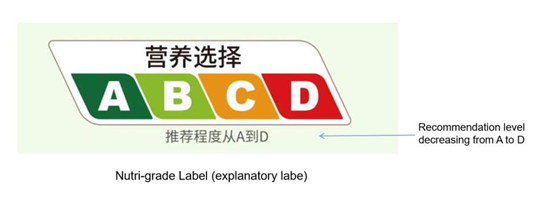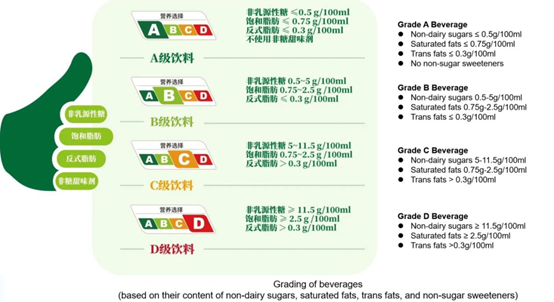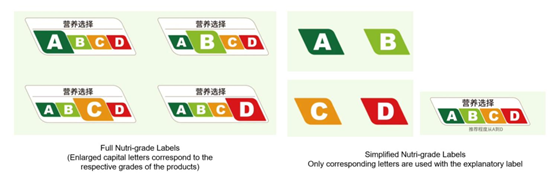On March 26th, 2024, the Shanghai Municipal Center for Disease Control and Prevention (SCDC) announced to pilot the "Nutri-Grade Labels" in Shanghai, aiming to guide the public towards healthier dietary habits. The grading system combines both domestic and international standards, based on beverages' nutritional composition and consumers' drinking habits. It grades beverages from A to D as per their content of non-dairy sugars, saturated fats, trans fats, and non-sugar sweeteners, with the recommendation level decreasing from A to D.

The grade assigned to a beverage is determined by the lowest grade among its evaluation criteria. For example, if a beverage contains 5.6g/100ml of non-dairy sugars (meeting the criteria for grade C), 1.2g/100ml of saturated fats (meeting the criteria for grade B), 0g/100ml of trans fats (meeting the criteria for grade A), and no non-sugar sweeteners (meeting the criteria for grade A), then the overall rating of the beverage would be grade C.

The nutri-grade labels can be applied to beverage packaging, product ordering systems, menus, and sales counters, featuring enlarged capital letters that correspond to the respective grades of the products. In instances where the full label cannot be displayed, a simplified version containing only the corresponding letter may be used, accompanied the by explanatory label.

The pilot project involves 6 enterprises focusing on health-oriented beverages, including CHAGEE, Naixue, and Starbucks. Take CHAGEE, an emerging Chinese freshly made tea beverage brand, for instance. The nutri-grade labels have been added to product menus at all CHAGEE stores in Shanghai, making it easier for consumers to make informed choices. Furthermore, different cup sizes, temperatures, and sugar levels correspond to different grades. As reported, the sales of grade A and B beverages at CHAGEE has steadily increased, with nearly 70% of consumers opting for healthier drinks after understanding the meaning of nutri-grade labels. It's also noteworthy that Naixue's ready-to-drink (RTD) beverages featuring the nutri-grade labels are available in selected convenience stores and supermarkets across Shanghai.
Actually, Shanghai has been actively promoting healthy dietary habits through labeling regulations since last year. In August 2023, a pilot initiative was launched to introduce health warning labels on sugary beverages, aimed at increasing consumer awareness of the health risks associated with excessive consumption of such beverages. In November 2023, the implementation of the Shanghai Patriotic Health and Wellness Promotion Regulations encouraged vendors of sugary and alcoholic beverages to prominently display health warning labels in their sales areas, covering not only pre-packaged beverages but also freshly made beverages. In December 2023, the Shanghai Municipal Health Commission issued the Notice on Launching Pilot Work for Nutritional Health Guidance in Shanghai, and selected pilot enterprises to participate in the project.
As consumers increasingly prioritize healthy dietary habits, ingredients, nutritional content and clean ingredient lists of beverages have become significant factors influencing consumer's choices. Amidst the growing demand for healthier options, sugar reduction has emerged as a prominent consumer trend. According to Nielsen, China's market size of sugar-free beverages reached approximately 24.1 billion yuan in 2023, with a YoY growth of 26%. RTD sugar-free tea beverages constituted 49% of this segment, experiencing an impressive growth rate of 110%. Fueled by the substantial market prospect, more players are entering the market to compete for a share. It's imperative for beverage brands to swiftly respond to the evolving consumer demands and offer tailored products to effectively capture consumer's preferences.
Source:Chemlinked
Note: This article is compiled by Antion, please indicate our source if reprint it.